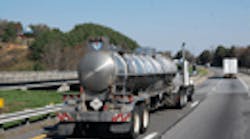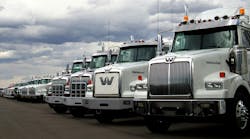If a bill to increase Interstate weight limits passes, orders for tanker trailers – both liquid and dry bulk – could explode as fleets adjust, according to Theodore “Ted” Fick, president & CEO of tanker trailer manufacturer Polar Corp. Even without passage of the bill, tanker orders are on the upswing, largely due to fleets replacing older units.
“This could really be a game changer for the industry as a whole, but for tanker fleets especially,” Fick told Fleet Owner during an interview at the 2011 Mid America Trucking Show in Louisville, KY. “Every other [industrialized] country allows 100,000 lb. [trailers], and by allowing trucks carry heavier loads, there would be fewer trucks on the road – a benefit to shippers, the environment, and the motorist public alike.”
The Safe and Efficient Transportation Act (SETA), introduced in the House of Representatives by Reps. Mike Michaud (D-ME) and Jean Schmidt (R-OH) as H.R. 763 in February, would give each state the option by raise its Interstate weight limit for trucks equipped with an additional axle to a maximum of 97,000 lbs.
While the mandate for an additional axle could hurt used tanker trailer values somewhat if fleets began to switch to three-axle models, Fick also believes it could open up more retrofit opportunities as well.
Aside from the potential impact of this legislation, though, he noted that tanker trailer orders are already on a big upswing and are likely to remain strong through 2012.
According to Polar’s numbers, tanker trailer sales fell from 8,800 units a year in the U.S. to 3,600 by 2009 due in large part to the global economic recession. Yet sales recovered to 5,400 units in 2010 and are projected to jump another 34 to 35% to 7,800 this year, climbing to 8,400 by 2012.
That’s reflective of a broad upsurge in trailer orders overall, noted Kenny Vieth, senior partner and general manager for ACT Research Co. According to ACT’s numbers, net orders for all commercial trailer types increased to 21,990 units in February, a gain of over 25% from January, with factory shipments posting a 105% gain last month versus February 2010.
The firm added that nine trailer categories – dry vans, flatbeds, tankers, etc. – have posted year-over-year gains for both net orders and factory shipments, with dry van net orders up over 90% and shipments up almost 225% year-to-date.
“The ramp-up in orders that we’ve been tracking has continued into 2011, with year-to-date total net orders up over 87% compared to 2010,” added Vieth. “Shipments are up an even stronger 116% when compared to the first two months of 2010, with rising backlogs setting the stage for solid industry performance this year.”
In particular, Fick noted orders for dry bulk trailers – typically one-third of the tanker trailer market, with the other two-thirds comprised of liquid carrying units – have really taken off.
“For all of 2009, the industry sold 322 dry bulk trailers. Yet in the first two months of this year alone, orders ended up well north of 322 units,” he pointed out.
“The only tanker trailer segment lagging right now is for petroleum units, ones hauling gasoline and diesel,” Fick added. “But that’s been due to a lot of consolidation in the market, such as the merger between the Pilot and Flying J truck stop chains. But now we’re even seeing those orders starting to pick up.”




